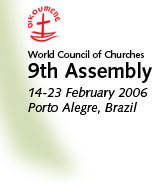 |
WCC > Home > News & media > News | ||||
| About the assembly | Programme | Theme & issues | News & media | |||||
 |
|
||||
|
20.02.06
WCC Assembly looks at the ecumenical future
More articles and free photos at
Leading theologians have addressed the World Council of Churches 9th Assembly on the theme of church unity. Scholars from the Protestant, Oriental Orthodox and Catholic traditions offered reflective comments on the document "Called To Be the One Church" in a session entitled "Church Unity – Claiming a Common Future".
Fr Jorge A. Scampini OP, of Argentina, a leading Roman Catholic Dominican theologian, urged the WCC to continue and strengthen its role as the "privileged instrument" of the ecumenical movement in the search for visible Christian unity. He was one of three speakers commenting in a plenary session on 20 February 2006.
The document, prepared by the Faith and Order commission, is "An invitation to the Churches to Renew Their Commitment to the Search for Unity and to deepen their Dialogue". It recapitulates previous work and statements on unity as a divine gift and calling, based on the common faith confessed in the Nicene-Constantinopolitan Creed and on common baptism. It concludes by addressing nine questions to the churches on their relationships with each other and their mutual recognition.
While emphasizing that, from a Roman Catholic perspective, some of the divergences mentioned in the document are real obstacles to visible unity, Fr Scampini welcomed the questions being addressed to the churches. He stated that the churches "should enter into a renewed conversation about the quality and degree of their fellowship and communion, and about the issues which still divide them".
The WCC, he continued, "must continue to have the role of 'privileged instrument'" in the cause of unity by continuing Faith and Order work on the divisive issues and "by adopting as an Assembly the text before you as your own word addressed to the churches".
Other speakers welcoming and commenting on the document were Fr Dr Jacob Kurien Malankara Orthodox Church, India who critcized the "ecumenical stagnation" of the present time, and Prof. Dr Isabel Apawo Phiri, a Malawian Presbyterian theologian living in South Africa . She urged that unity must embrace people’s grassroots concerns, such as ecumenical marriages, gender-based violence and difficulties faced by ordained women in carrying out their ministry.
The document "Called To Be the One Church" will be considered later in the Assembly in the light of comments received.
In the next stage of the plenary, a Latin American Pentecostal theologian, Dr J. Norberto Saracco, said that in recent years evangelical and Pentecostal churches had "worked hardest in the quest for visible unity". Acknowledging the work done elsewhere on theological and institutional questions, Sarraco suggested "That way of doing ecumenism has gone as far as it can . . . the ecumenical agenda must disentangle itself from the past and become open to the future."
In a joint presentation, two youth participants, Lei Garcia (United Church of Christ, Philippines) and John Njige Njoroge (Orthodox, Kenya) used drama to convey their vision of unity as dynamic relationships, sharing the struggles of the people and in sharing in worship "without pointing at each other as liturgically 'right' or 'wrong' but rather listening to and spiritually benefitting from each other’s liturgical practices".
Speaking to journalists on the theme with the Orthodox Archbishop Anastasios of Tirana and All Albania and the Lutheran Bishop Margot Kässman, Archbishop Desmond Tutu said, "God has a dream. He longs desperately for the time when all his children know they belong in one family. In this quest, the WCC is crucial, as God's instrument for engaging us to realize God's dream."
He spoke of the breadth of ecumenical relations, saying, "We don't take seriously enough the fact that God is God of all. We are too prone to excommunicate, because we can't stand the fact that God welcomes all. I'm glad that God is God."
Archbishop Anastasios of Tirana and All Albania said that church unity was "a duty and a necessity", particularly in an age of globalization. "If there is not this direction, it is a new scandal to the world," he said. He stressed the nature of the WCC as "a forum for people" rather than as an institution. "Without the WCC, which has been so important for me, it would have been impossible for me to know and to love Archbishop Tutu and Bishop Kässman. The WCC, he said, was "a forum of love and hope".
Rev. Dr Margot Kässman of the Evangelical Lutheran Church in Germany spoke of the "impatience" with ecumenism she perceived, saying, "If we cannot recognize each other as churches in the full sense of the word, it is very difficult for us to call the peoples of the world to more unity."
She called for the Roman Catholic Church to allow ecumenical worship together, and for a revision of guidelines on inter-confessional marriages to allow couples to partake of the eucharist together. Such marriages "should not be seen as dividing but as uniting," she said.
Assembly website:www.wcc-assembly.info
Contact in Porto Alegre:+55 / 51 8419.2169
|
|||
|
|
|

